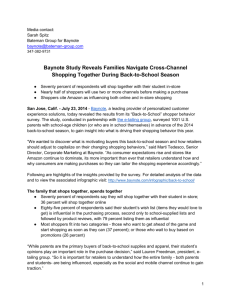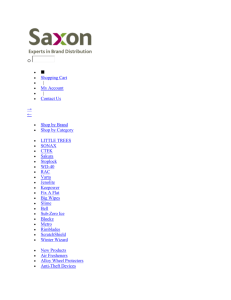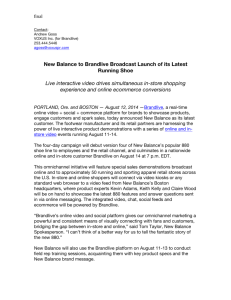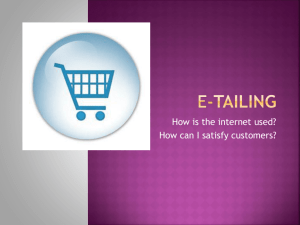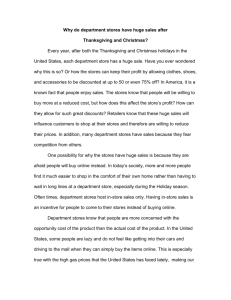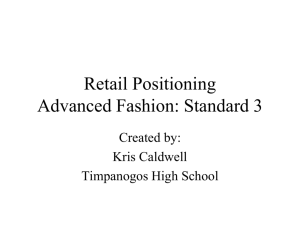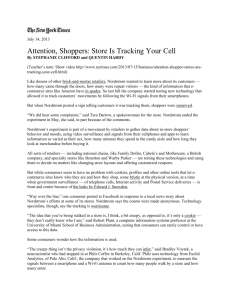- The e
advertisement
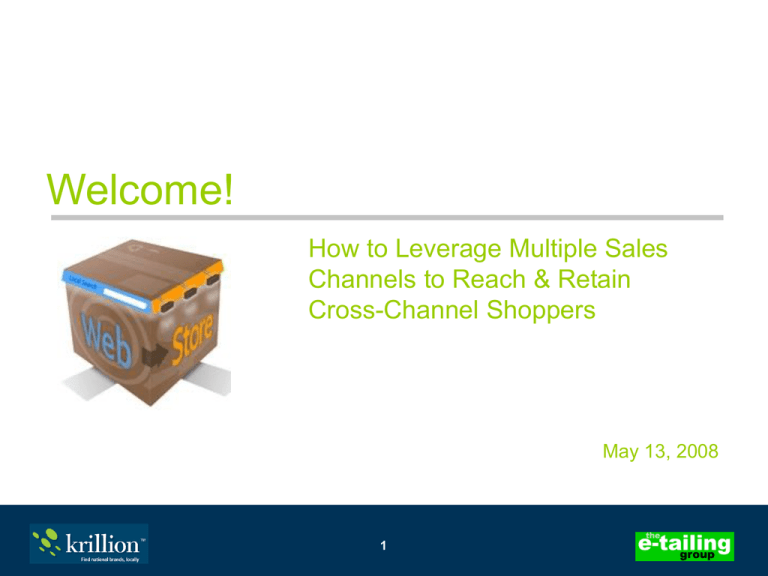
Welcome! How to Leverage Multiple Sales Channels to Reach & Retain Cross-Channel Shoppers May 13, 2008 1 Before we start Submitting questions – Submit a question at any time by using the “ask a question” module on the lower right-hand side of your console – We’ll address these questions during the 10 minute Q&A section at the end of our presentation Technical difficulties – Click on the help button – Use the “ask a question” interface 2 Today’s presentation Highlights from the Krillion Consumer Survey Current retailer and manufacturer strategies Readiness recommendation checklist 3 Today’s presenters Lauren Freedman President the e-tailing group Joel Toledano CEO Krillion 4 About Krillion What we do: – Product-based local search – Driving online users to in-store sales Who we work with: – Leading manufacturers, retailers, publishers, and search engines 5 5 About the e-tailing group 14 years of e-commerce consulting Author, “It’s Just Shopping” 50+ years traditional retail and catalog experience Fortune 500 client projects ranging from strategic planning, merchandising, marketing, to technology development and messaging Proprietary research studies on: mystery shopping & merchandising; marketing and multi-channel customer mindset; In-Store Pickup and Gift Registry E-commerce expert and frequent speaker at industry events, trade associations 6 Purpose and methodology To better understand the mindset of consumers who research products online that lend themselves to purchase at a local store. The study highlights the role of Internet information resources, the retailer channel, and web-to-store convenience options offered online—such as in-store pickup and inventory availability—in shaping consumer purchase decisions. Survey completed February 2008 1,000 consumers sampled 50% male, 50% female Spend at least $500 online annually Purchase online at least 4x per year 7 Web-ready buyers are demanding “Web-Ready Buyers” are demanding, doing their shopping “homework” well in advance of their purchase “Web-Ready Buyers” who are predisposed to research online are willing to spend at least several days or weeks researching products They are first and foremost problem solvers who leverage the web’s efficiencies to quickly find the right answers to their shopping needs 8 These customers leverage all channels, seeking complete information The role of the manufacturer online has been elevated: a visit to their site is often the first stop for savvy online information seekers The store is an integral part of shoppers’ multi-channel buying experiences Expectations are high for Web-Ready Buyers regarding: the number of information sources they seek out the features they expect to see on any given site their propensity for using in-store pickup 9 The ‘Local’ proposition is clear Saving time, convenience and saving money are consistently what matter most to consumers when using a local search engine to research products online To the consumer, local is getting the right price for an in-stock product at a favored retailer 10 Prior to buying, consumers are spending considerable time online in ‘research mode’ What percent of the time you spend shopping (store/web/catalog) involves researching products online? 25% 26% 21% 16% 12% 1-14% 15-29% 30-49% 50-74% % of time spent researching products online 11 Q3 More than 75% 42 percent of shoppers spend more than half of their total shopping time researching online Shoppers multi-source: 72% look to the manufacturer’s website when researching major branded products online, while 54% seek out favored retailers Beyond this, shopper styles affect where consumers start their research When shopping for a specific manufacturer's product (i.e. GE dishwasher, HP Printer or Panasonic HDTV) which online resources will you typically use to conduct your research? Select all that apply. 72% Visit the manufacturer's website Go to one of my favorite retailers online to learn more about what they have to offer and their prices 54% Go to a comparison shopping engine to check out prices of the products in which I'm interested 50% 47% Conduct a search online and look at a handful of search listings found Visit a store or several stores to preview the product and then go online to learn more 38% Go to a search engine that has brands I'm looking for and local information about availability and pricing Other* 12 Q6 30% 4% Consumers are first and foremost needs-driven, with many influences triggering their search for online product information Word-of mouth continues to play an important role similarly valued by consumers What are the leading media and other influencers that typically trigger your search for product information online? Select all that apply. To solve an immediate need 58% Word of mouth 56% TV commercial 50% Prior visit to a store 49% Catalogs/Direct mail 44% Magazine or newspaper ads 44% Article about the product 42% Newspaper circulars 38% Consumer Reports Magazine 38% Online promotion or banner ad Email 28% 26% 13 Q11 • Women are more traditional: favoring word-of-mouth, catalogs, magazines, newspapers • Men are more webcentric: embracing online promotions, banner ads and email Depending upon the complexity of the product category, those surveyed invest several days or even months researching prior to making a purchase Several days to weeks or even months are typically spent researching these product categories prior to making a purchase. 80% 76% 73% 63% 45% ea r G ea r 37% or G Sp or ts /O ut do y Ba b /G ar de n La w n/ na l& Pe rs o er E su m Co n 14 Q8 Pa tio Ca rA ud io ic s le ct ro n lia nc es Ap p Co m pu te rs 38% Top 3 essential online resources: manufacturers, retailers, search engines Secondary sources include shopping comparison sites, consumer magazines online, portals/directories, and blogs Please rate each of the following web resources based on how essential they are to your online product research. Most Somewhat Least essential essential essential Manufacturer websites 61% 35% 4% Retailer websites Search engines Shopping comparison sites Consumer magazines online Portals and other directories Blogs 54% 53% 39% 37% 25% 10% 15 Q13 42% 41% 43% 43% 53% 25% 4% 6% 18% 20% 22% 65% For complex product categories, manufacturer websites are the #1 destination 16 Q6 Online retail experiences take place in many ways 17 Exposing products can be facilitated via a series of different channels and a variety of means 18 Searching is part and parcel of the user experience, where the “best” price is top of mind 19 Saving time (76%), convenience (69%), and saving money (64%) are consistently what matter most Given the ability to research products online using a local product search engine, what 3 aspects of this kind of experience do you find most appealing? It saves me time 76% It's more convenient; allows me to comparison shop with context including product information and customer reviews 69% 64% It saves me money It allows me to efficiently do my research prior to store visits 38% It lets me know what product is available at retailers in my neighborhood Allthe information across many local retailers is available at one site 20 Q17 30% 23% For online shoppers, “local” means the right price for an in-stock product at a favored retailer What do you see as drawbacks you have experienced that may inhibit purchasing products at a local retailer using online information resources? Select all that apply. Finding the best price for purchase locally vs. buying through an online reseller 59% 53% Finding local retailers that have the product in stock 52% Finding local retailers that carry the product near me The time it takes researching/searching for the right product near me 30% 21 Q15 Shoppers expect websites to aid in research, provide up-to-the-minute information Please rate the importance of the following website features, information or tools to selecting a product you have researched online but intend to purchase at a local store. Rating of very to somewhat important 88% Inventory/stock status 87% Special offers Ability to sort & refine by brand, price, product feature, etc. 83% Ability to compare products side by side in a grid format 83% Customer ratings/reviews 83% 80% Search website by keyword or product number 79% Price history/price tracking 75% Complete list of local stores 69% Pickup in-store options 48% Recently viewed 43% Relevant advertising 35% Wish list 22 Q16 To help make purchasing decisions, consumers embrace peer-based content like product reviews (84%) and consumer surveys/studies (57%) Product images (49%) and literature (48%) are expected sources of information that further support decision-making What types of online content do you most frequently read, download or pass on to help you make a purchase decision? 84% Product reviews 57% Consumer surveys/studies 49% Product images 48% Product literature 39% Product news 28% Articles written by journalists or experts 26% How to guides 17% Videos Other* 2% 23 Q14 • Women trend higher on image and product reviews • Men care more about expert articles and videos Customer-centric tools foster decision-making 24 When selecting a local store to make a purchase consumers desire a comprehensive website including convenience-centric, store-related services Website features that are "very to somewhat important" as they relate to purchasing decisions when selecting a store in one's local area to make a purchase (top 2 on a 5-point scale). 87% In-store returns Current store promotions 85% Detailed store information 81% Delivery options 80% Manufacturer rebates 79% 76% Product locator w/inventory access prior to store visit 69% In-store pickup options 25 Q9 Store promotions and services are evaluated simultaneously 26 The store is an integral part of shopper behavior frequently involving multiple store visits For information-intensive purchases, consumers are more apt to research online and then complete their purchase at a local store When thinking about purchasing products in the following categories, which of the following best describes your research and shopping process? Please select your top two most likely scenarios for each category. APPLIANCES CONSUMER LAWN/PATIO ELECTRONICS /GARDEN COMPUTERS PERSONAL & CAR AUDIO BABY GEAR A combination of store visits and online research where final purchase would be at the local store 57% 69% 56% 53% 59% 51% 48% Research online and buy at a local store 52% 69% 50% 51% 53% 48% 48% Go to a local store to research, make my final selection and purchase 35% 29% 42% 43% 50% 40% 44% Research online and buy online 30% 17% 32% 29% 20% 32% 38% A combination of store visits and online research where final purchase would be online 26% 16% 20% 24% 18% 29% 22% 27 Q7 SPORTS/ OUTDOOR GEAR Store visits often start with sophisticated retail locators 28 55% have purchased a product online for in-store pick-up, increasing the role of web-to-store activity Have you ever purchased a product online and picked it up in-store? Yes 55% No 45% 29 Q4 Merchants extend their reach, driving traffic to the store via in-store pickup 30 Buyers who pick up in-store are motivated by shipping savings and convenience benefits What was your primary motivator for choosing to pick up a product purchased online vs. having it shipped? Select one. Save shipping expense 50% 22% Convenience Immediate need Other* • Among women saving on shipping is even more of a motivator as it was selected by 63% Note: Beyond saving shipping expenses, immediate needs and convenience will always play an important role in “local” shopping 18% 4% Enjoy visiting the store 3% Not home to receive product 3% *Other includes shipping not an option, out of stock online; taking advantage of a discount offered if picked up in-store 31 Q5 Product locators with inventory access will serve as the ultimate foundation for future cross-channel conveniences 32 Are you ready? Comprehensive content must be in place Category-centric tools should give customers the control they demand to swiftly satisfy and solve shopper needs Manufacturers must extend their efforts through retail and search partners Cross-channel conveniences should be clear to shoppers Merchants must think about both time and cost savings when structuring multi-channel experiences 33 Q5 The e-tailing group contact information Lauren Freedman President, the e-tailing group inc 773.975.7280 lf@e-tailing.com www.e-tailing.com 34 Joel Toledano CEO Krillion Inc Krillion: leveraging product-based local search 35 What shoppers care about Consumers think: “research online buy offline” – Search on Google – Buy in a physical store Who carries this product near me? What does it cost? Is it in stock right now? 36 36 Search engines, shopping engines and directories, are not one-stop shops Search engines don’t provide everything consumers need: – product – location – price – in-store availability 37 37 In-store pickup is already popular 2007 online sales (est.): $1.1 billion 2007 online sales (est.): $1.5 billion 55% picked up in store 40% picked up in store In-store pickup averages $60 more per customer ticket In-store pickup averages $154 more per customer ticket Source: National Retail Federation 38 38 And will become mainstream… eMarketer predicts: 1. 2. 3. 4. 5. 6. • Multichannel retailers will roll out more “buy online, pick up in-store” services. Online ads remain resilient. Video surge slows. Social-network advertising hits $1.6 billion. Networking goes beyond MySpace and Facebook. YouTube decides the election. Beijing Olympics pumps up ad spending. 7. Buy online, pick up in-store becomes expected feature. 8. Movie downloading hits the mainstream. 9. Music marketers roll out new business models. 10. Dynamic ads heighten gaming revenue potential. • Forrester Research reports 79% of multichannel retailers ensure consistent pricing across their channels. • Internet Retailer finds 75% of retailers link their e-commerce systems to their fulfillment and order management system. Source: eMarketer Inc 39 39 How Krillion enables web-to-store sales Krillion has built a huge local shopping dataset of manufacturers, SKUs, store locations & in-stock product availability – more than 700 million data elements, and growing • Yellow Pages Leads! Ready-to-buy consumers • Product reviews • Shopping sites Local Retailers • Widget on manufacturer websites • Search engines Krillion Localization EngineTM • Metadata by category • Product categories 40 40 The Home Depot case study: increased click performance Launched: February 2008 Objectives: • Increase click performance online with contextual marketing • Drive sales through all Home Depot offers on/offline Results: • 4x conversions to “see it” locally button • 2x average CTR on all ad impressions served 41 41 Panasonic case study: sales uplift & tighter linkage Launched: March 2008 Objectives: • Increase site capabilities to drive more sales to dealers • Offer real-time stock information Results: • Thousands of new views/month and growing • Double-digit conversions to “see it” locally button • Increased conversion to sale from Panasonic.com to dealers 42 Bridging the Internet and the store What’s next? Mobile coupons will capitalize on the web-to-store opportunity – Offers sent to consumers drive in-store purchasing Micro-local targeting through location-aware technologies“ “Mobile phones are more likely to be used in a multichannel shopping process than to generate m-commerce sales.” –Gartner Group, Feb. 2008 43 43 Three ways to work with us to grow your web-influenced sales 1. Manufacturers: Krillion Product Locator drives revenue and directs in-store sales to dealers 2. Retailers: enhanced placements and integrated advertising to drive in-store sales 3. Publishers: Leverage Krillion’s product-based local search platform to increase audience engagement revenue opportunities 44 44 For more information about working with Krillion to power your product locator or support your local in-store sales efforts, contact us at sales@krillion.com 45 45 Q&A 46 Thank You! 47
